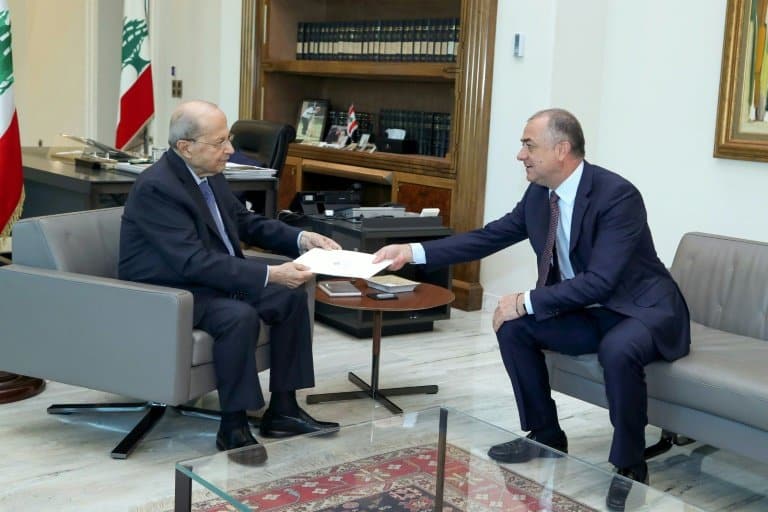Israel-Lebanon maritime border deal hailed as ‘historic’

Israel said Tuesday it has reached a US-brokered agreement with Lebanon to settle their long-disputed maritime border, hailing a “historic agreement” that potentially unlocks significant offshore gas production for both countries.
Lebanon said the proposed final text was “satisfactory”, while US President Joe Biden praised the “breakthrough” and urged all parties to stick to the deal.
Negotiations between the neighbouring countries, which are still technically at war, had suffered repeated setbacks since their launch in 2020.
But they gained momentum in recent weeks with both sides eyeing revenue from potentially rich Mediterranean gas fields.
US envoy Amos Hochstein floated a proposed final agreement earlier this month that Israel welcomed, but Lebanon sought some adjustments.

Lebanon-Israel disputed maritime border / © AFP
Israel said last week it intended to reject Lebanon’s requested changes, even if that made a deal impossible, but negotiations continued, culminating in what both sides described as acceptable final terms.
“Israel and Lebanon have reached an historic agreement settling the maritime dispute,” said a statement from Israeli Prime Minister Yair Lapid’s office, adding that the deal would “strengthen Israel’s security”.
Lebanon’s presidency said the proposed final text submitted by Hochstein was “satisfactory to Lebanon” and voiced hope that “the agreement on the demarcation will be announced as soon as possible”.
Lebanese Prime Minister Najib Mikati, following a meeting with President Michel Aoun, said that there was “full agreement on the English draft of the agreement”.
Aoun will review the Arabic translation and is expected to make an official announcement by Wednesday, Mikati added.
– ‘Positive for both sides’ –
Biden hailed the agreement as a “historic breakthrough”.
“The governments of Israel and Lebanon have agreed to formally end their maritime boundary dispute,” Biden said in a statement. “It is now critical that all parties uphold their commitments and work towards implementation.”
A major source of friction was the Karish gas field, which Israel insisted fell entirely within its waters and was not a subject of negotiation.

An Israeli warship sits at mooring close to the disputed maritime border with Lebanon / © AFP/File
Lebanon reportedly claimed part of the field and Hezbollah, the powerful Iran-backed militant group that holds huge sway in Lebanon, threatened attacks if Israel began production at Karish.
Hezbollah said Tuesday it would back the agreement if it is officially endorsed by the Lebanese government.
“If the president announces that Lebanon’s official position supports the agreement, then, for us… things are settled,” the group’s chief Hassan Nasrallah said in a televised speech, calling the prospect of gas riches the “only door” to prosperity for the crisis-hit country.
Israel’s Defence Minister Benny Gantz called the accord “positive for both sides” and criticised Hezbollah, which he said “attempted to destroy the process” with its threats.

London-listed firm Energean has begun testing a pipeline connecting the disputed Karish gas field to the Israeli coast / © Energean Plc/AFP/File
The US text has not been made public but under terms leaked to the press, all of the Karish field would fall under Israeli control, while another potential gas field, Qana, would be divided but its exploitation would be under Lebanon’s control.
French company Total would be licensed to search for gas in the Qana field, and Israel would receive a share of future revenues.
– Israeli election –
Israel had said production would begin at Karish as soon as possible, regardless of Lebanon’s demands.
On Sunday, London-listed firm Energean began testing the pipeline linking Karish to the Israeli coast, a key step before starting production.
Lebanon’s chief negotiator Elias Bou Saab said Lebanon will “get its full rights from the Qana field”, and Israel might receive compensation through Total.
There will be no direct partnership in gas exploration or exploitation between the two enemy states, he said.
The Israeli premier has said his government is committed to exporting more gas to Europe to help replace Russian deliveries hit by the war in Ukraine.
But Israel’s November 1 general election has overshadowed the recent phases of the negotiations.

Israel and Lebanon remain technically at war and the land border between the neighbouring countries is patrolled by UN peacekeepers / © AFP
The Knesset, Israel’s parliament, said in a statement that the accord would be presented to parliament on Wednesday evening.
Right-wing opposition leader Benjamin Netanyahu has charged that Lapid had “capitulated” to Hezbollah by moving forward with an agreement.
It was not clear if Netanyahu, who remains determined to reclaim the premiership he held from 2009-2021, had seen the deal’s proposed terms.
But he has vowed that the hawkish government he hopes to form next month with his far-right and religious allies will not be bound by any agreement with Lebanon.





